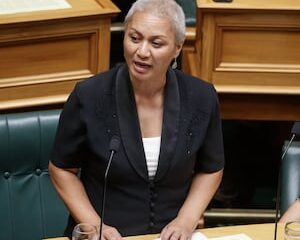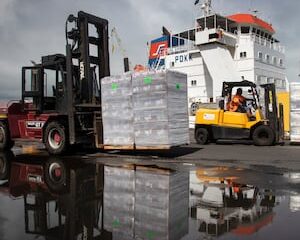Business
Trump’s Tariff Changes Create Uncertainty for New Zealand Businesses

New Zealand businesses are facing heightened uncertainty following US President Donald Trump‘s recent decisions regarding tariffs on imports. The President’s cancellation of tariffs on several food products, including beef and kiwifruit, has evoked mixed reactions from local economists. While the changes can be seen as beneficial, the unpredictability surrounding them is causing stress for many businesses in New Zealand.
John Ballingall, an economist at Sense Partners, noted that the frequent alterations in tariff policies have made it challenging for companies to plan for the future. “When businesses are uncertain, they tend not to invest or hire people,” he explained. “The constant flip-flopping is certainly affecting businesses’ planning.” According to Ballingall, the unpredictable nature of the current economic environment complicates significant investment decisions and hiring.
Impact of Tariff Changes on New Zealand’s Export Market
Trade Minister Todd McClay expressed optimism about the potential recovery of export trade in beef and kiwifruit, suggesting that it could return to previous levels. Nevertheless, he acknowledged that the ever-changing rules imposed by the United States present substantial challenges. “We estimate there’s a tariff saving of $300 million, but it is the changing nature that is concerning some of our exporters more than the tariff rates themselves,” McClay stated in a recent interview.
Many exporters are expected to renegotiate contracts over the coming year, but the prevailing uncertainty could hinder their ability to secure agreements. Ballingall further highlighted that the recent tariff cancellation might be indicative of broader trends. “What we will see over the next few months is that US consumers, and therefore voters, are starting to get very frustrated with the high cost of living, and that’s what has driven the cancellation of these tariffs,” he said.
As inflation continues to rise in the United States, there is a possibility that more tariffs could be lifted, depending on the economic pressures faced by the administration. Ballingall pointed out the significance of the upcoming midterm elections, which could further intensify pressure on the administration. “The fact that US voters are starting to become much more concerned about cost of living issues will be troubling the administration,” he added. “They probably don’t want to be going into those elections fighting a cost of living crisis.”
The implications of Trump’s tariff changes extend beyond just numbers; they affect the livelihood of businesses and workers in New Zealand. The ongoing economic uncertainty underscores the need for businesses to remain agile and adaptable in a rapidly changing global trade environment.
-

 Sports2 months ago
Sports2 months agoNetball New Zealand Stands Down Dame Noeline Taurua for Series
-

 Entertainment2 months ago
Entertainment2 months agoTributes Pour In for Lachlan Rofe, Reality Star, Dead at 47
-

 Entertainment1 month ago
Entertainment1 month agoNew ‘Maverick’ Chaser Joins Beat the Chasers Season Finale
-

 Sports2 weeks ago
Sports2 weeks agoEli Katoa Rushed to Hospital After Sideline Incident During Match
-

 Sports2 months ago
Sports2 months agoSilver Ferns Legend Laura Langman Criticizes Team’s Attitude
-

 Politics1 month ago
Politics1 month agoNetball NZ Calls for Respect Amid Dame Taurua’s Standoff
-

 Entertainment3 months ago
Entertainment3 months agoKhloe Kardashian Embraces Innovative Stem Cell Therapy in Mexico
-

 Sports2 weeks ago
Sports2 weeks agoJamie Melham Triumphs Over Husband Ben in Melbourne Cup Victory
-

 World4 months ago
World4 months agoPolice Arrest Multiple Individuals During Funeral for Zain Taikato-Fox
-

 Sports3 months ago
Sports3 months agoGaël Monfils Set to Defend ASB Classic Title in January 2026
-

 Entertainment2 months ago
Entertainment2 months agoTyson Fury’s Daughter Venezuela Gets Engaged at Birthday Bash
-

 Sports2 months ago
Sports2 months agoHeather McMahan Steps Down as Ryder Cup Host After Controversy















